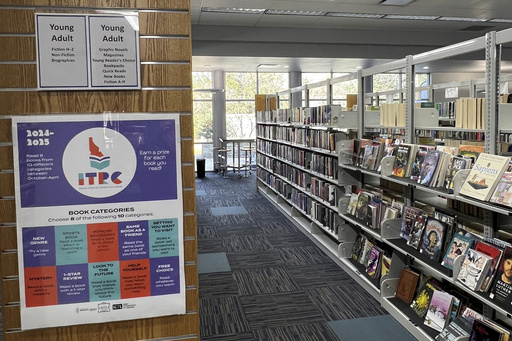
BOISE, Idaho — A lawsuit has been initiated by a group of prominent publishers, a small public library, and others against Idaho state officials, contesting a law that mandates libraries to place certain books in adults-only sections if deemed “harmful to minors” by community members.
The plaintiffs, including the Donnelly Library and Penguin Random House, argue that the law lacks clear definitions and infringes on the First Amendment rights of students, librarians, and community members by compelling libraries to isolate notable literary works such as “Slaughterhouse-Five” and “A Clockwork Orange.”
This lawsuit marks the second time such a complaint has been lodged in Idaho, following a similar suit filed last summer by a coalition of small private schools and libraries, which is still being pursued. Comparable lawsuits have been raised in various states, including Arkansas, Iowa, Florida, and Texas, focusing on laws that impose limitations on book access within libraries and educational institutions.
In legal documents presented to Idaho’s federal court, attorneys for the plaintiffs emphasized that many readers first encounter these literary works as adolescents in school environments or public libraries with input from qualified educators and librarians. “Those days are over. Idaho now requires public schools and libraries to either isolate these works from youth or face potential lawsuits, challenges, and financial penalties for allowing minors to access these important texts,” the attorneys stated.
Representatives for Idaho Attorney General Raul Labrador, who is named as a defendant in the lawsuit, refrained from commenting because the case is under legal consideration.
According to the American Library Association, there has been a dramatic increase in book banning efforts in recent years, with public and school libraries inundated with complaints alleging inappropriateness, often instigated by conservative organizations like Moms for Liberty.
In response to these initiatives in several Republican-led states, legislators have enacted laws imposing stringent repercussions—including civil suits, monetary fines, and even jail time—against libraries and individuals found to be distributing books considered inappropriate. Conversely, some Democratic-led states, like Washington and Illinois, have moved to prohibit book bans altogether.
The Idaho legislation went into effect last year, necessitating schools and libraries to transfer any materials classified as “harmful to minors” into an adults-only area or risk litigation. If a community member raises concerns about a book’s suitability for minors, the library must respond within a 60-day window, or risk facing a $250 lawsuit from concerned parents or minors.
The law is based on Idaho’s legal definition of obscene content, which includes acts of homosexuality. At the time of its passage, the Idaho Library Association cautioned that the law’s vagueness would likely restrict public access to information significantly.
This predicted outcome appears to be materializing, as reflected in the lawsuit. The Donnelly Public Library, serving a small town of approximately 250 residents and hosting the only after-school program available, resorted to prohibiting minors from entering unless a parent or guardian signed a waiver.
Given that the library is housed in a quaint log cabin with a few teepees, it lacks the capacity to designate an adults-only section for some titles, including “The Handmaid’s Tale.”
Christie Nichols, a librarian in Idaho’s largest school district and one of the plaintiffs, revealed that she was directed to remove about 30 books from her collection at Rocky Mountain High School and return them to district authorities. This directive came despite her conviction that the works possess significant literary, political, or scientific merit for her students, as they appeared on a list of approximately 60 books the district flagged as controversial.
Two students have also joined the lawsuit, including a 17-year-old from Lewiston who expressed frustration over being unable to access essential reading materials for his college-level courses due to the restrictions. An 18-year-old from Meridian similarly remarked on the confusion surrounding her access to the previously restricted books, despite her current eligibility to check them out from the school library.

